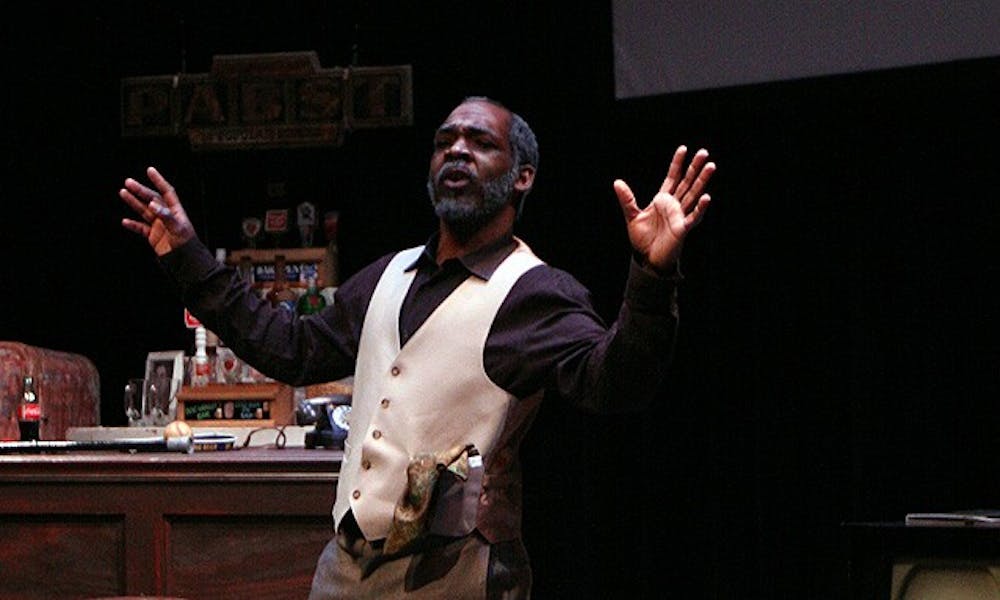Art Tatum has been dead for more than 50 years, but don’t tell that to Kip Frey.
Frey, CEO of Triangle-based audio technology company Zenph Sound Innovations and adjunct professor of public policy at Duke, intends to revive the eminent jazz pianist with a stage production called Piano Starts Here. The one-man show, which runs through Dec. 19 in Raleigh’s Kennedy Theater, documents fictional nightclub owner Doc Hanley as he shuts down his Harlem establishment following Tatum’s death in 1956. Hanley reminisces about his time with the jazz great, aided by the music of Tatum himself.
“It’s… a chance to live in the moment of a jazz club as it experiences its last days,” Frey said.
Though Tatum is considered by some to be the most talented jazz pianist of all time, the details of his legacy remain largely unknown to all but the most devoted aficionados. The team at Zenph developed an interest in the pianist in 2008, when they first worked with his pivotal 1949 album Piano Starts Here in the location of its original recording—the Shrine Auditorium in Los Angeles, Frey said. Impressed by his genius yet disappointed with his minimal popular renown, the company sought to bring his work to a larger audience through the theater.
That same year, the show opened at the Apollo Theater in Harlem and was met, initially, with a lukewarm response.
But Frey said that due to significant word-of-mouth, it began attracting more and more viewers.
“By the time word got around, we had standing room only crowds,” he said. “Part of the appeal is bringing Tatum to an audience who’s not familiar with him.”
Jay O’Berski, director of the show and assistant professor of the practice for the Department of Theater Studies, said Tatum’s music is particularly conducive to the stage.
“I find his music very intense and challenging,” O’Berski said. “It makes for good theater.”
O’Berski said the current iteration of Piano Starts Here is markedly different from the one that debuted at the Apollo. Whereas the 2008 version was somewhat sugar-coated or “Disney-fied,” as O’Berski put it, the Raleigh performance reflects to a greater degree the hardships that Tatum faced.
“The writer [Jeff McIntyre, vice president and executive producer at Zenph] had an original script that was darker and had more teeth, and we went back to that one,” he said. “[Tatum] was a black, blind jazz musician in the ’20s, ’30s and ’40s. It had to have been hellish.”
Although the production only features a single actor—Trevor Johnson, who works regularly with Durham’s Manbites Dog Theater—Piano Starts Here is more than just a one-man show; Tatum’s music is an equally prominent component. Zenph developed a new technology called Re-Performance, which was applied to a specially designed piano that “plays” 12 of his songs throughout Hanley’s monologue.
Beyond simply improving sound quality—the process involved in remastering—Re-Performance analyzes music as computer data rather than recorded sound waves, Frey said. This creates new possibilities for the ways in which engineers understand and manipulate the sound, with the ultimate goal of replicating entire performances exactly the way they were first played.
Before Zenph’s treatment, Tatum’s recordings were subject to the technological constraints of the time. Enthusiasts lamented the fuzz, hissing and popping that marred the sound quality of many of his records.
Now, audiences have the chance to hear his music as though “he’s in the room with them,” Frey said.
O’Berski said the result for the production is a far cry from the average player-piano.
“It really [captures] every sort of nuance as when someone actually plays an instrument,” O’Berski said. “Every missed note and the flavor and spirit of the actual person can suddenly get picked up with this technology. You’re not getting something that sounds perfect, you’re getting something that sounds very human.”
Indeed, Frey said Zenph wanted “to highlight the piano as a character.”
With the use of Re-Performance and the original script, Frey said Raleigh’s show will offer viewers an unparalleled and hyper-realistic glimpse into the life and music of one of jazz’s most iconic figures.
“It’s a very immediate experience,” he said. “People will be interested in Tatum’s music and how technology works and relates to the human experience.”
Get The Chronicle straight to your inbox
Signup for our weekly newsletter. Cancel at any time.

